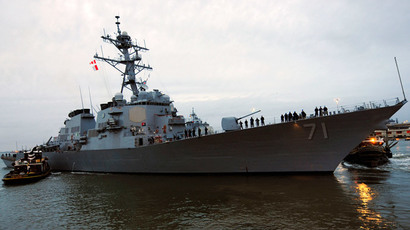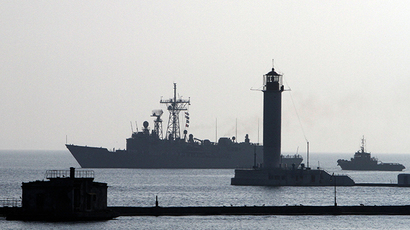US 6th Fleet flagship docks in Georgia after entering Black Sea

The USS Mount Whitney has docked in Georgia’s Black Sea port of Batumi. The ships visit is intended to “strengthen ties” with the United States’ NATO allies and partners and promote “peace and security in the region,” the US Embassy in Georgia said.
The US command ship entered the Black Sea on Saturday, one day after the guided missile destroyer USS Cole arrived in the region.
According to a press release from the US Sixth Fleet, Mount Whitney's mission is to reassure its NATO allies of the US Navy’s commitment towards strengthening and improving interoperability in the region.
“This is a great opportunity to meet face-to-face with our naval counterparts, enhancing alliances, and strengthening bonds as we advance our common goal of safety, stability, and security in the region," the ship's commanding officer, Captain Mark Colombo, said at the welcome ceremony.
#USSMountWhitney arrives in #Batumi#Georgiahttp://t.co/vEO550lNtc
— U.S.NavyEuropeAfrica (@NAVEUR_NAVAF) October 14, 2014
The ship is slated to conduct routine combined training with the Georgian Coast Guard, provide ship tours, hold a public concert for the local community, and host a reception for local officials, the US embassy in Tbilisi said in a statement.
The ship is set to depart on October 18.
Tuesday’s stopover is the third port visit to Georgia by the US Sixth Fleet’s amphibious command and control ship. The trip was previously dispatched to deliver humanitarian aid in September 2008, after the so-called 'Five-Day War' the previous month, which started after Georgia attacked the South Ossetian capital of Tskhinval. The ship made a second visit in November 2013.

Earlier this year, the ship was dispatched to the Black Sea during the Sochi Winter Olympics.
US naval vessels have regularly been deployed since turmoil broke out in Ukraine earlier this year.
In September, Standing NATO Maritime Group 2 – which includes the US, the UK, Germany, Greece, Spain, Italy, the Netherlands, and Turkey, as well as the naval forces of Bulgaria, Romania, and Canada – carried out naval exercises off the territorial waters of Romania.
The US also joined other NATO members to conduct naval drills in the region in July.
Meanwhile, USS Mount Whitney can only remain in the region for a maximum of three weeks, in line with the 1936 Montreux Convention.
Despite the limits set by the convention, NATO has maintained its presence by regularly rotating ships in and out of the area.
USS Cole and USS Mount Whitney now both operating in the #BlackSea, ready to work w/ @NATO allies & partners in region.
— U.S.NavyEuropeAfrica (@NAVEUR_NAVAF) October 11, 2014
Moscow has characterized NATO’s actions as saber rattling in its backyard.
In September, Russia announced it would add more than 80 new warships to its Black Sea fleet by 2020. Moscow also intends to complete a second Black Sea naval base near the city of Novorossiysk by 2016.
Vice Admiral Aleksandr Vitko said the base at Novorossiysk was necessary due to NATO expansions. He further accused NATO of planning to build a naval base in the Black Sea, a claim NATO officials have denied.
Speaking at an emergency Security Council meeting in late July, Russian President Vladimir Putin said Russia would respond to NATO’s expansion towards its borders.
“No matter what our Western counterparts tell us, we can see what’s going on," he said. "As it stands, NATO is blatantly building up its forces in Eastern Europe, including the Black Sea and the Baltic Sea areas. Its operational and combat training activities are gaining in scale.”
Putin added that NATO’s military build-up near Russia’s border is not just a defensive measure, but an “offensive weapon” and an “element of the US offensive system deployed outside the mainland.”














